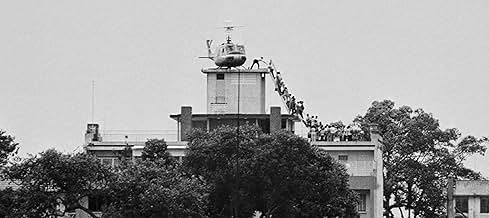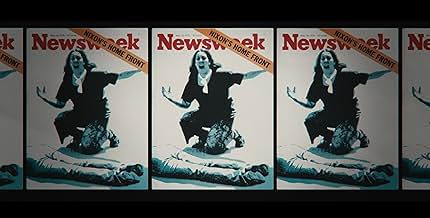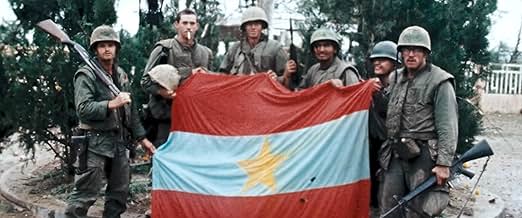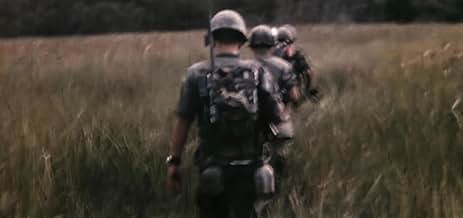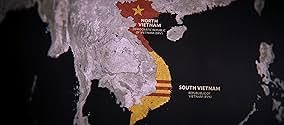Punto de inflexión: La guerra de Vietnam
Título original: Turning Point: The Vietnam War
- Miniserie de TV
- 2025
- 1h 15min
Los profundos efectos de la guerra de Vietnam en la identidad estadounidense, que provocan divisiones sociales y erosionan la confianza del gobierno. Más que una derrota militar, transformó ... Leer todoLos profundos efectos de la guerra de Vietnam en la identidad estadounidense, que provocan divisiones sociales y erosionan la confianza del gobierno. Más que una derrota militar, transformó la política y la cultura estadounidenses.Los profundos efectos de la guerra de Vietnam en la identidad estadounidense, que provocan divisiones sociales y erosionan la confianza del gobierno. Más que una derrota militar, transformó la política y la cultura estadounidenses.
Explorar episodios
Opiniones destacadas
Another exceptionally objective docuseries from the new master of historical shows.
As a Brit, I can appreciate that my reaction and perspective to this series & the Vietnam war in general is wildly different from anyone in the US. Conversely, since my country opted not to engage in the conflict, we weren't really educated on it any real detail - so broadly speaking, even as a bit of a history dweeb, I'm pretty ignorant when it comes to any of the decades-long western battles against communism.
That's why I'm especially grateful to the talents of Brian Knappenberg.
Rather than portraying 9/11, the Cold War or in this latest fine entry into his canon as a 'rah! Rah! America!' Indulgence, he's proactively evenhanded, fair & draws remarkably detailed and articulate accounts from people who were really there. Yet despite the density of information & intelligence with which it's done, it's still accessible to even a Luddite like me.
It's powerful, powerful stuff - and while I can absolutely 100% appreciate that this must be deeply grating for a lot of those in the states, as a fascinated outsider? It's quite an excellent entry into the mountains of existing work covering this engrossingly chaotic period in modern human history.
Bravo.
As a Brit, I can appreciate that my reaction and perspective to this series & the Vietnam war in general is wildly different from anyone in the US. Conversely, since my country opted not to engage in the conflict, we weren't really educated on it any real detail - so broadly speaking, even as a bit of a history dweeb, I'm pretty ignorant when it comes to any of the decades-long western battles against communism.
That's why I'm especially grateful to the talents of Brian Knappenberg.
Rather than portraying 9/11, the Cold War or in this latest fine entry into his canon as a 'rah! Rah! America!' Indulgence, he's proactively evenhanded, fair & draws remarkably detailed and articulate accounts from people who were really there. Yet despite the density of information & intelligence with which it's done, it's still accessible to even a Luddite like me.
It's powerful, powerful stuff - and while I can absolutely 100% appreciate that this must be deeply grating for a lot of those in the states, as a fascinated outsider? It's quite an excellent entry into the mountains of existing work covering this engrossingly chaotic period in modern human history.
Bravo.
I enjoy learning about 20th century American history, and the Vietnam War is one of my favorite documentary topics. I was initially concerned that this documentary would be filled with anti-American bias, however, it was much more balanced than I expected. The burning of villages by American/ARVN forces was discussed in one episode, for example, but it was also acknowledged that the North Vietnamese did a lot more of that kind of destruction. In one episode, a Viet Cong woman explains why she hated the Americans but also notes that many North Vietnamese didn't really understand what communism entailed. On the other hand, you had one million living in the North flee to the South when the civil war truce occurred, suggesting that many people did understand what life under communism meant (somewhat reminiscent of the East Germans escaping to West Germany, or maybe those Koreans living in the North who relocated to the South). To me this suggests the North Vietnamese victory was a pyrrhic one because while North Vietnam won, the people still didn't have most of the freedoms some people in the West take for granted nor the power. Of course, no more foreign control or interference. But I wonder if their lives changed for the better. We do know a million people from the South escaped (boat people) four years later.
Some critics have said that this documentary is a little too biased for their tastes. But I, someone who gets annoyed when I hear bias, didn't think so. To be sure, there was one guy in Episode 5 who annoyed me because I think he was being dramatic for the camera. Nevertheless, everyone else spoke in a measured way with occasional sincere emotions. All facts to me, and interesting perspectives, too. Some critics also suggest some important details were left out. I think this is true to some extent. No mention of the death of Ho Chi Min in 1969, for instance. I don't think General Giap was mentioned either. Still, I think for a five episode series, and given it's aim, it was wonderfully edited and directed. I love learning new details about subjects I'm already familiar with and this documentary did not disappoint.
I think the first 20-30 minutes of Episode 1 left me a little unclear how this documentary would play out. However, after that it started to grab my interest. As to be expected, there's a lot of sadness, grief, strife, and so on, on both sides. But don't take that as gratuitous anti-Americanism. Rather, I think the director was focused on telling a story from all points of view and how the Vietnam War permanently changed America and the relationship the American people has with their government because of it.
Some critics have said that this documentary is a little too biased for their tastes. But I, someone who gets annoyed when I hear bias, didn't think so. To be sure, there was one guy in Episode 5 who annoyed me because I think he was being dramatic for the camera. Nevertheless, everyone else spoke in a measured way with occasional sincere emotions. All facts to me, and interesting perspectives, too. Some critics also suggest some important details were left out. I think this is true to some extent. No mention of the death of Ho Chi Min in 1969, for instance. I don't think General Giap was mentioned either. Still, I think for a five episode series, and given it's aim, it was wonderfully edited and directed. I love learning new details about subjects I'm already familiar with and this documentary did not disappoint.
I think the first 20-30 minutes of Episode 1 left me a little unclear how this documentary would play out. However, after that it started to grab my interest. As to be expected, there's a lot of sadness, grief, strife, and so on, on both sides. But don't take that as gratuitous anti-Americanism. Rather, I think the director was focused on telling a story from all points of view and how the Vietnam War permanently changed America and the relationship the American people has with their government because of it.
I really enjoy this kind of documentary, especially because its length - over five hours - allows it to take its time and properly explore a story from as many angles as possible.
What struck me most, personally, was that I ended up feeling sympathy and even a kind of sorrow for both sides. The filmmaker makes a real effort to stay as neutral as possible, showing the motivations - and especially the suffering - on both sides of the conflict.
One real eye-opener for me was what happened to the South Vietnamese who had worked with the Americans, after the US defeat and the communist takeover. It was shocking to see the consequences they faced. And what's more, the country is still divided in many ways because of this war - emotionally, politically, socially.
Neither side is painted as the bad guy.
What struck me most, personally, was that I ended up feeling sympathy and even a kind of sorrow for both sides. The filmmaker makes a real effort to stay as neutral as possible, showing the motivations - and especially the suffering - on both sides of the conflict.
One real eye-opener for me was what happened to the South Vietnamese who had worked with the Americans, after the US defeat and the communist takeover. It was shocking to see the consequences they faced. And what's more, the country is still divided in many ways because of this war - emotionally, politically, socially.
Neither side is painted as the bad guy.
As a British Army veteran with a longstanding interest in the Vietnam War, I approached Turning Point: Vietnam with the hope that it would offer a rich, balanced perspective on one of the most politically and morally complex conflicts of the 20th century. Unfortunately, what unfolds is a disappointingly narrow and overly Americanised narrative, filtered through a distinctly modern lens.
This series seems more interested in drawing parallels with today's ideological and cultural debates than offering a sober, historically accurate examination of the war itself. It applies 21st-century sensibilities to 20th-century geopolitics, and in doing so, misses the nuance, context, and texture that this subject demands. It felt less like a documentary and more like a vessel for contemporary messaging-at times bordering on revisionist history.
What's particularly jarring is the near-total absence of Vietnamese voices, both from the North and the South. The conflict, after all, was fought on their soil, among their people, and with devastating impact. The series gives little space to understanding the motivations of the North Vietnamese or Viet Cong beyond standard Cold War tropes, and barely touches on the tragedy of South Vietnam's fall. There's a living history here that is fading fast, yet the documentary doesn't seem interested in preserving or exploring it.
Likewise, Australia-America's most significant ally in the conflict outside of South Vietnam-is not mentioned at all. Over 60,000 Australians served in the war, with more than 500 killed. Their absence from this series further underscores the US-centric lens through which the entire conflict is portrayed. There's also scant reference to other contributing nations, such as South Korea, Thailand, or the Philippines, nor any deep analysis of the international ramifications of the war on post-colonial Asia.
The Vietnam War was never just a 'bad chapter' in American history, it was a global flashpoint, the culmination of colonial collapse, Cold War paranoia, and regional resistance movements. Any serious documentary on the subject should strive to examine not just what happened, but why, from all angles.
In the end, Turning Point, Vietnam feels like a missed opportunity. At a time when first-hand accounts are still possible, and when global perspectives are more accessible than ever, this series retreats into a familiar, overly simplified narrative. It does a disservice not only to viewers but also to the complexity-and humanity-of those who lived through the war on all sides.
This series seems more interested in drawing parallels with today's ideological and cultural debates than offering a sober, historically accurate examination of the war itself. It applies 21st-century sensibilities to 20th-century geopolitics, and in doing so, misses the nuance, context, and texture that this subject demands. It felt less like a documentary and more like a vessel for contemporary messaging-at times bordering on revisionist history.
What's particularly jarring is the near-total absence of Vietnamese voices, both from the North and the South. The conflict, after all, was fought on their soil, among their people, and with devastating impact. The series gives little space to understanding the motivations of the North Vietnamese or Viet Cong beyond standard Cold War tropes, and barely touches on the tragedy of South Vietnam's fall. There's a living history here that is fading fast, yet the documentary doesn't seem interested in preserving or exploring it.
Likewise, Australia-America's most significant ally in the conflict outside of South Vietnam-is not mentioned at all. Over 60,000 Australians served in the war, with more than 500 killed. Their absence from this series further underscores the US-centric lens through which the entire conflict is portrayed. There's also scant reference to other contributing nations, such as South Korea, Thailand, or the Philippines, nor any deep analysis of the international ramifications of the war on post-colonial Asia.
The Vietnam War was never just a 'bad chapter' in American history, it was a global flashpoint, the culmination of colonial collapse, Cold War paranoia, and regional resistance movements. Any serious documentary on the subject should strive to examine not just what happened, but why, from all angles.
In the end, Turning Point, Vietnam feels like a missed opportunity. At a time when first-hand accounts are still possible, and when global perspectives are more accessible than ever, this series retreats into a familiar, overly simplified narrative. It does a disservice not only to viewers but also to the complexity-and humanity-of those who lived through the war on all sides.
There have been several documented series covering the subject matter over the decades , but this one ( in my humble opinion ) is the most concise . It doesn't skirt around the truth and in particular the lies from both sides . And there were lots of falsehoods by both and successive administrations about what was being done " over there " . Episodes three and four encapsulated the worst of what was being carried out , both in Vietnam and in America in 1968 . I'm disappointed that the producers didn't critique the over promoted and utterly hopeless Westmorland in more detail , as he more or less brought the whole thing to its knees and cost the lives of thousands of American servicemen and woman , not to mention the millions of Vietnamese civilians who were brutalised on a daily basis . The delicious irony of including the biggest draft dodger in history , John Wayne , was not lost on me.
A series for the ages.
A series for the ages.
¿Sabías que…?
- TriviaAired on the 50th anniversary of the Fall of Saigon.
Selecciones populares
Inicia sesión para calificar y agrega a la lista de videos para obtener recomendaciones personalizadas
Detalles
- Fecha de lanzamiento
- País de origen
- Idioma
- También se conoce como
- Turning Point: The Vietnam War
- Productora
- Ver más créditos de la compañía en IMDbPro
- Tiempo de ejecución
- 1h 15min(75 min)
- Color
Contribuir a esta página
Sugiere una edición o agrega el contenido que falta



